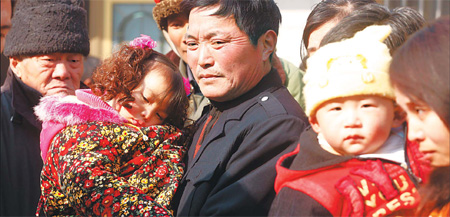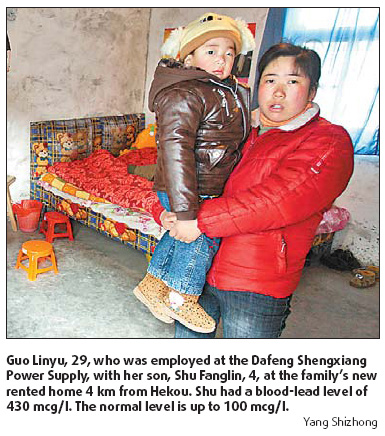Tipping off polluters
It is becoming a familiar tale in China: a local government approves a factory, nearby residents fail in their objections, then residents start to fall seriously ill years, if not months later.
The recent reports of lead poisoning among at least 55 children and 47 adults living beside a battery factory in Hekou village, Jiangsu province, follow the usual pattern.
 |
|
Wang Wanshan, 55, of Hekou, holds his granddaughter Wang Chengcheng, 4. She has an excessive blood-lead level - 279 mcg/l - but is yet to be treated. [China Daily] |
But the case has highlighted more than just poor environmental planning; it has also exposed serious flaws in a supervision system that allowed a polluting factory close to a residential area of more than 100 families to operate at 160 percent above its legal production capacity.
Test results shown to China Daily last Friday showed at least eight children had more than 200 micrograms of lead per liter of blood, double the normal levels, while some adults registered about 600 mcg/l.
About 70 villagers a day are being given blood tests by disease prevention and control staff officials from Yancheng, the prefecture-level city that administers Hekou.
The official number of poisoning cases was still to be released last night but villagers said at least 100 children had been affected.
It is the sixth lead poisoning scandal to be exposed in China in six months, with similar reports involving a total of about 3,300 youngsters in Shaanxi, Hunan, Yunnan, Fujian and Henan. Each time the blame has been laid at the door of a nearby lead smelter of battery factory.
In Hekou, the fingers of residents and government officials are pointed at Dafeng Shengxiang Power Supply Co Ltd, a lead-acid battery manufacturer that lies 50 m from the village.
The plant began operation in 2007 and has been subject to constant complaints, mostly about the pungent smell it discharged into the air at 10 pm every night.
Villagers said they reported the problem but were told by local officials "nothing is wrong with the factory emissions". Yet following investigations into the scandal, local authorities said the factory had expanded production without permission from its approved 500,000 batteries to 1.3 million. It is unclear how long the factory had been doing this, but it was the unauthorized increase that caused the lead poisoning, said officials.
So how was Dafeng Shengxiang Power Supply able to continue overproducing despite regular visits from the environment bureau?
"We always had enough time to prepare. Environment officials investigating residents' complaints never found anything wrong at the plant."
 0
0 








Go to Forum >>0 Comments